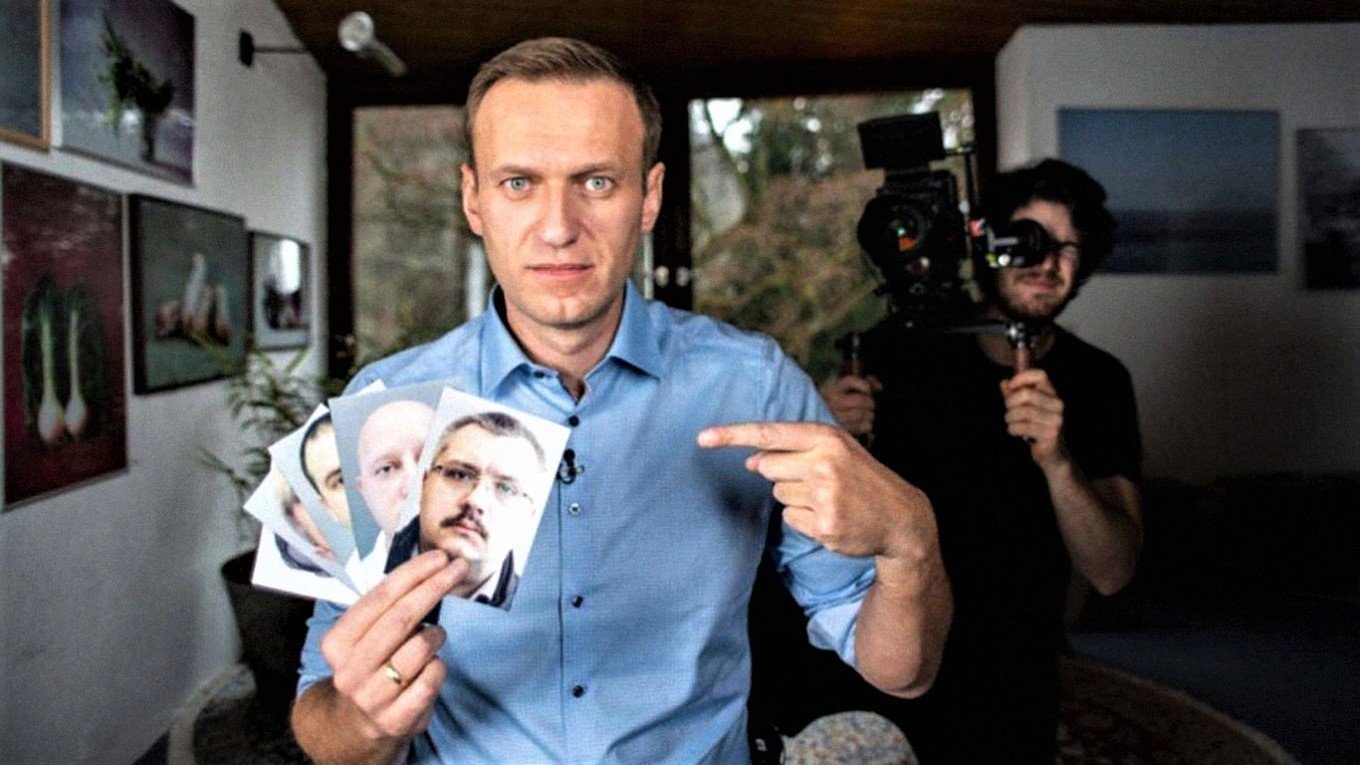Navalny
Daniel Roher’s outstanding documentary on the Russian dissident Alexei Navalny should be in the running for an Oscar next year.
Most films released just after the end of the awards season are unlikely to become prize winners because by the time that they qualify they are regarded as old hat. It is, however, possible that Daniel Roher’s documentary feature Navalny could become the exception to the rule. It goes without saying that in making a film about the Russian dissident Alexei Navalny, one centred on the attempt to poison him, Roher had great material to work on. Nevertheless, what he has given us more than lives up to any expectations arising from that. Despite its April release, Navalny will surely deserve every award going in due course including the 2023 Oscar for Best Documentary.
After a brief introduction Roher starts his film on the plane in which the defiant Navalny chose to return to Russia in January 2021. It then goes back in time in order to follow through the key events in chronological order: the poisoning which started to take effect on a plane trip from Siberia back to Moscow, the landing of the plane in Omsk where Navalny was hospitalised and his subsequent transfer to Berlin where it was first confirmed that he had indeed been poisoned, this being contrary to the medical pronouncements made in Omsk. Once out of intensive care, Navalny would stay in Germany for some months to recover his strength and during this period he did a long interview with Roher which plays a central role in this film. However, there are also comments from others. These include his wife Yulia and his 19-year-old daughter Dasha, his chief of staff Leonid Volkov, Maria Pevchikh the chief investigator for Navalny's Anti-Corruption Foundation (now functioning in exile having recently been declared an extremist organisation Russia) and a number of journalists and reporters including Christo Grozev of the independent research group Bellingcat. The film briefly invites comments from Navalny about his previously established identification with Russian nationalism. It touches also on the fact that, when embracing the cause of free elections in Russia in 2011, he was willing to treat even Nazi groups as colleagues. However, for the most part this film leaves aside his past including his career as a lawyer. Instead it concentrates on what he has become, an activist who is a thorn in Putin’s side and a figure acclaimed by many of his countrymen as the symbol of Russia's freedom. Naturally, recent news footage plays a part here alongside what was shot directly for the film.
In handling this wide range of material Roher shows real skill in making it all cohere, keeping the narrative crystal clear and balancing the various elements. In doing so he gives the film the urgency of a thriller and captures wonderfully the energy of Navalny himself. If this documentary is a splendid indictment of Putin, it is also an extraordinary portrait of the highly organised Navalny who, far from being a sombre figure, has an engaging persona and a determined optimism. His skills as a strategist are evidenced by the numbers he reaches through TikTok and indeed, he emerges as a master in handling today’s media. Late in 2020 he used Facebook and other sources to put out a video of a prank call during which, concealing his identity, he talked to a Russian chemist who admitted knowledge of how the Federal Security Service had a team intent on killing Navalny and gave details of how his poisoning had been handled. This makes for a terrific set-piece quite as memorable as the scene in Spike Lee's BlacKkKlansman (2018) in which a black man, Ron Stalworth, calls a white supremacist group pretending to be a white man sharing their views. By being the real thing and not a reconstruction, this sequence outdoes that highlight of Lee's film.
It is striking that in spite of the terrible risk taken by Navalny in returning to Russia his family patriotically support him in this. At its close the film refers to the imprisonment which not unexpectedly awaited him there but, ahead of the written statements that bring us up-to-date, we return to the flight back to Russia glimpsed earlier. In addition, we now see the crowds of supporters awaiting him at the airport where they are manhandled and then hear the pilot explaining that the landing will take place at a different airport “due to technicalities on the ground”. Grim as the situation is while Putin remains president, Roher’s film is not downbeat and it aptly concludes with a statement from the interview that he did with Navalny. Roher asked what he would want to say to the Russian people should he be killed. That leads to Navalny responding to his possible death by saying simply that if he should indeed be killed it would be evidence of how powerful Russia's dissident voices are and consequently a reason to fight on.
MANSEL STIMPSON
Featuring Alexei Navalny, Yulia Navalny, Dasha Navalny, Zakhar Navalny, Marya Pevchikh, Christo Grozev, Leonid Volkov, Kira Yarmysh, Georgy Alburov, Fidelius Schmid, Tim Lister, Clarissa Ward.
Dir Daniel Roher, Pro Odessa Rae, Diane Becker, Melanie Miller and Shane Boris, Screenplay Jamie Dack and Audrey Findlay, Ph Niki Waltl, Ed Langdon Page and Maya Daisy Hawke, Music Marius De Vries and Matt Robertson.
Cottage M/Fishbowl Films/RaeFilm Studios-Dogwoof Pictures.
98 mins. USA. 2022. US Rel: 11 April 2022. UK Rel: 15 April 2022. Cert. 12A.


